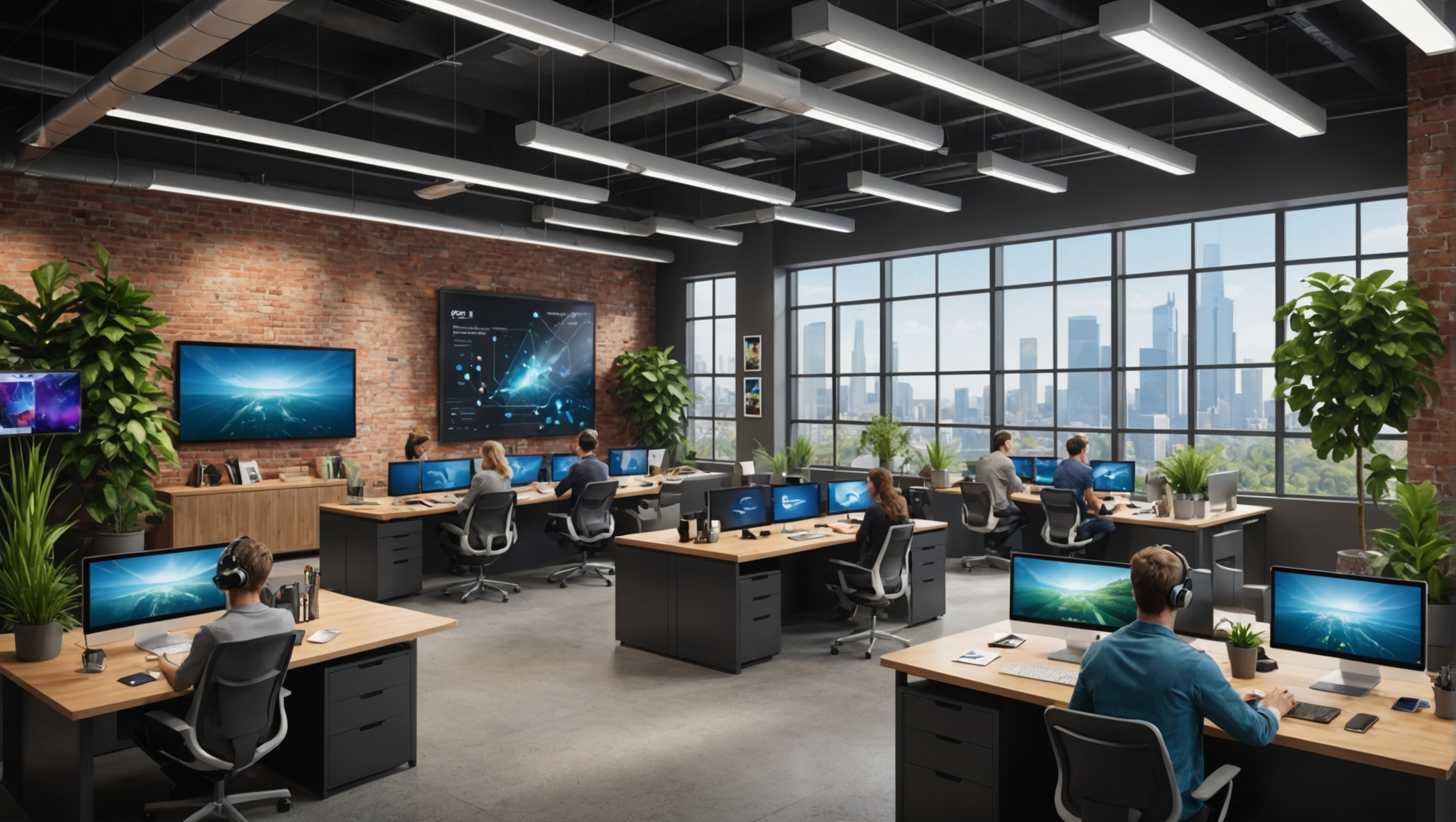In a constantly evolving world, startups are proving to be essential catalysts for industrial innovation. Born from the overflowing imagination of young entrepreneurs, these companies are redefining traditional paradigms and injecting a new dynamic into established sectors. By combining advanced technologies and bold strategies, they establish themselves as forces of transformation within the industry.
This focus on new innovative players highlights startups that not only disrupt the industrial landscape but also implement sustainable and effective solutions. From blockchain to ensure traceability in supply chains to the use of artificial intelligence to optimize processes, these companies are at the forefront of a digital revolution.
Through this exploration, we delve into the most promising initiatives and exemplary business models that are shaping the future of the industry. From energy to transportation, through fashion and new technologies, let’s discover how these champions of innovation are preparing to transform our very conception of the industrial sector.
In recent years, startups have emerged as true catalysts for change within the industry, shaking up traditionally established sectors. With the rise of digital technologies and process innovations, these new players have not only reshaped the industrial landscape but also introduced methods that optimize production, improve sustainability, and reinvent logistics chains.
Table des matières
ToggleNumbers and Players
According to a recent study, about 60% of industrial SMEs plan to invest in innovative startups by 2025 to improve their competitiveness. Several factors explain this growing interest, notably the transition to Industry 4.0, which integrates advanced technologies such as IOT (Internet of Things) and AI (Artificial Intelligence).
Among the significant examples is Carbon, a startup that has developed revolutionary 3D printing technology, allowing not only faster production of objects but also reducing waste associated with manufacturing. Carbon’s polymerization technique has been adopted by prestigious companies such as Adidas to create customized sneakers. This innovative model has demonstrated the potential of 3D printing to transform traditional manufacturing into a more efficient and circular method.
Strategic Advantages and Practical Recommendations
Integrating innovative startups into the industrial transformation process can prove to be a major asset. Companies looking to differentiate themselves and maximize their operational efficiency should consider several strategies:
- Proactive collaboration: Establishing partnerships with startups can benefit from a variety of innovative solutions and technical expertise. For example, the integration of blockchain technologies by startups in the fashion sector has optimized traceability and improved transparency in supply chains while meeting growing consumer demands for ethics.
- Investment in research and development: By allocating resources to research, companies can not only improve their products but also create new services that better meet market needs. For instance, companies like Plug Power are investing in hydrogen technologies to transform how energy is produced and consumed in the manufacturing sector.
- Innovation culture: To make the most of collaborations with startups, it is essential to cultivate a culture of innovation within teams. Encouraging employees to integrate startup solutions into their daily work can lead to significant improvements and a reduced environmental footprint.

Future Perspectives and Global Impacts
The coming years look promising for the industrial landscape, with the continuous rise of startups that continue to innovate and reinvent business models. For example, the rise of green technologies and sustainable solutions is expected to lead to a reevaluation of investment priorities among large industrial groups, which increasingly integrate sustainable development into their strategies.
Moreover, the cybersecurity sector is evolving rapidly with the emergence of new startups dedicated to data protection, a crucial issue in the digital age. As highlighted in this article on cybersecurity, these companies offer innovative solutions that address contemporary challenges related to information protection.
In conclusion, the environment conducive to industrial startups represents an alliance between innovation, research and development, and adaptability. Companies that succeed in integrating these new players into their operations will not only be able to stand out but also play a key role in defining the industries of tomorrow.
To delve deeper into the themes surrounding innovation in industry, discover the cases of digital disruption or the role of Industry 4.0 in energy at this link: Industry 4.0.
Finally, don’t miss our article on market trends in the Middle East for 2024: Market Trends.
FAQ
How are startups transforming traditional industry?
Startups introduce innovative technologies and disruptive business models into established sectors, improving efficiency, reducing costs, and meeting new demands. They also accelerate digitization by utilizing AI, IoT, blockchain, and other technologies to optimize industrial processes.
Which industries are most impacted by startups?
- Manufacturing and Industry 4.0: With automation, digital twins, and real-time production.
- Energy and Greentech: Startups offer solutions for energy efficiency, renewable energy, and smart grid management.
- Logistics and supply chain: Optimization of distribution with AI-based tracking systems and fleet management platforms.
- Healthcare: MedTech and BioTech startups revolutionizing diagnostics, treatments, and health data management.
- Construction: Modular construction technology, innovative materials, and sustainable solutions.
What are the main challenges for a startup aiming to revolutionize the industry?
- Adoption of new technologies: Traditional companies may be slow to adopt new solutions, often preferring tried-and-true systems.
- Access to funding: Industrial startups often require significant investments to develop their products.
- Regulation: Compliance with local, national, and international standards, which are often rigid in industrial sectors.
- Strategic partnerships: Finding established companies willing to collaborate can be challenging.
What is Industry 4.0, and how do startups contribute to it?
Industry 4.0 is the ongoing industrial revolution, characterized by intelligent automation, the Internet of Things (IoT), artificial intelligence, and connectivity between systems. Startups are at the forefront by developing technologies such as:
- Industrial IoT: For real-time data collection and analysis.
- Autonomous robots: Capable of adapting to changing environments.
- Predictive analytics: Equipment maintenance and process optimization.
- Digital twins: Digital replicas of factories or machines to test scenarios in real-time.
What are the key technologies used by startups to transform the industry?
- Artificial Intelligence and Machine Learning: To automate tasks and analyze large data sets.
- Blockchain: To ensure transparency and traceability in supply chains.
- 3D Printing: Used in manufacturing complex parts at lower costs and with shorter lead times.
- Augmented and Virtual Reality: For training, maintenance, and design in real-time industrial environments.
How can startups collaborate with large industrial companies?
- Technological partnerships: Co-development of products or services.
- Innovation hubs and incubators: Many large companies create incubation programs to help startups access key resources.
- Acquisitions: Large companies can acquire startups to quickly access innovative technologies.
- Pilot projects: Collaboration to test solutions on a small scale before broader deployment.
What are the benefits for an industry adopting solutions from a startup?
- Flexibility and innovation: Startups are more agile and can quickly experiment with new solutions.
- Access to cutting-edge technologies: Startups are often the first to integrate innovations like AI or blockchain into industrial applications.
- Cost reduction: Optimization of processes through new technologies, such as automation or smart resource management.
- Improved competitiveness: Adopting disruptive solutions allows staying at the forefront in a rapidly changing market.
How can startups raise funds to innovate in the industry?
- Venture Capital: Investments from companies specialized in industrial technologies.
- Public grants: Many governments support industrial innovation through funding programs.
- Crowdfunding: For projects with a strong technological component, some startups use crowdfunding to test their market and raise funds.
- Strategic partnerships: Collaborate with large companies that finance development in exchange for privileged access to technology.
What are the emerging trends among industrial startups?
- Circular economy: Startups that offer solutions for recycling, reusing, and reducing industrial waste.
- Predictive maintenance: Using AI, startups enable the prediction of breakdowns and optimize machine maintenance.
- Collaborative robotics (Cobots): Robots designed to work alongside humans in industrial environments.
- Advanced materials: Development of new materials that are lighter, stronger, and more sustainable for industries like aerospace or automotive.
How can an industry prepare for the arrival of disruptive startup solutions?
- Invest in innovation: Allocate resources to research and development.
- Encourage a culture open to change: Train teams to adapt to new technologies and working methods.
- Test new solutions: Launch pilot projects with startups to assess the impact of new technologies.
- Keep track of trends: Participate in innovation events, join incubator networks, and monitor new market solutions.





